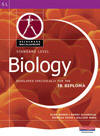 |
Which IB Biology book do I need?
The book for this course is Biology Standard Level or
Biology Higher Level depending on which level you are taking.
The book is available at the EABJM Bookshop (SL is 41€ and HL is 52€). Or
you can
click here to order the SL from Amazon France.
Alternatively,
click here for the HL book. If you think you might switch
levels during the year, it is safer to buy the HL book. |
| |
|
| |
 |
|
|
|
|
|
|
|
|
New System
- Starting in September 2011, I am trying out the
school's new online homework system on the "Vie Scolaire" page. I
will leave this site up as a page of resources but the weekly homework
should be on the school's site.
|
|
|
Corrèze Field Course Information and Data
Read these first - they explain which investigations can
count towards DCP or CE and how to proceed:
Results
These sheets contain the results from each investigation.
It is important to note that at the bottom of most of the Excel sheets,
there are tabs to see Group A, Group B, Group C, etc.
|
|
|
|
|
|
|
|
|
Revision for the Testing Week in May 2011:
(text in blue
is new since last term)
- The following concepts from Topic 1:
- 1.1.1 error bars on graphs
- 1.1.2 mean and standard
deviation calculations
- 1.1.3 what does the standard
deviation represent?
- 1.1.4 how is the standard
deviation used?
- All of Topic 2:
- 2.1 Cell theory
- 2.2 Prokaryotic cells
- 2.3 Eukaryotic cells
- 2.4 Membranes
- 2.5 Cell division
- The following sections of Topic 3:
- 3.1 Chemical elements and water
- 3.2 Carbohydrates Lipids and Proteins
- 3.3 DNA structure
- 3.4 DNA replication
- 3.5 Transcription and translation
- 3.6 Enzymes
- The following sections of Topic 4:
- 4.1 Chromosomes, genes,
alleles and mutations
- 4.2 Meiosis
- 4.3 Theoretical genetics
- The following sections of Topic 5:
- All of Option D :
- D.1 Origin of life on Earth
- D.2 Species and speciation
- D.3 Human Evolution
- Remember, when you study, always follow this order:
- start with the IB Programme Guide for Biology
to see what the assessment statements are (i.e. "Compare prokaryotic and
eukaryotic cells.")
- use the guide to help you grasp the difference
between each command term (define, identify, describe, outline,
explain, evaluate... on pages 11 and 12)
- refer to any class notes you have
- see what the sections in the book have to say
- double check that you have memorized all the
scientific vocabulary terms (this is what the flash cards are for) -
you should have hundreds by now and you should know them in both
directions: word to definition and definition to word.
- it is worth practising with the questions at the end
of the chapter - you can check your answers at the back of the book
Have a look at my compositions
groupées revision guide. It contains suggestions
for successful revision and test-taking skills.
|
|
|
|
|
|
|
|
|
 |
|
|
Revision for the Bac Blanc
practice exams in February 2011:
- All of Topic 2:
- 2.1 Cell theory
- 2.2 Prokaryotic cells
- 2.3 Eukaryotic cells
- 2.4 Membranes
- 2.5 Mitosis
- The following sections of Topic 3:
- 3.1 Chemical elements and water
- 3.2 Carbohydrates Lipids and Proteins
- 3.3 DNA structure
- 3.4 DNA replication
- 3.5 Transcription and translation
- 3.6 Enzymes
- The following section of Topic 5:
- Remember, when you study, always follow this order:
- start with the IB Programme Guide for Biology
to see what the assessment statements are (i.e. "Compare prokaryotic and
eukaryotic cells.")
- use the guide to help you grasp the difference
between each command term (define, identify, describe, outline,
explain, evaluate... on pages 11 and 12)
- refer to any class notes you have
- see what the sections in the book have to say
- double check that you have memorized all the
scientific vocabulary terms (this is what the flash cards are for) -
you should have almost 100 by now and you should know them in both
directions: word to definition and definition to word.
- it is worth practising with the questions at the end
of the chapter - you can check your answers at the back of the book
Have a look at my compositions
groupées revision guide. It contains suggestions
for successful revision and test-taking skills.
|
|
|
|
|
|
|
|
|
To do during the vacation:
- Reading assignment: Section 2.5 about
mitosis. You
need to list the vocabulary words, define them and memorize them. It
is strongly suggested that you practice drawing the different phases of
mitosis - it is the best way to know if you understand the complete
process.
- To help you visualize what is happening, check out the
"Mitosis" section of this web site: www.johnkyrk.com.
Note that he has an extra step in mitosis which we do not need to know for
IB Biology.
|
|
|
|
|
|
Revision for the Bac Blanc
practice exams in November 2010:
- All of Topic 2:
- 2.1 Cell theory
- 2.2 Prokaryotic cells
- 2.3 Eukaryotic cells
- 2.4 Membranes
- 2.5 Mitosis
- Remember, when you study, always follow this order:
- start with the IB Programme Guide for Biology
to see what the assessment statements are (i.e. "Compare prokaryotic and
eukaryotic cells.")
- use the guide to help you grasp the difference
between each command term (define, identify, describe, outline,
explain, evaluate... on pages 11 and 12)
- refer to any class notes you have
- see what the sections in the book have to say
- double check that you have memorized all the
scientific vocabulary terms (this is what the flash cards are for) -
you should have almost 100 by now and you should know them in both
directions: word to definition and definition to word.
- it is worth practising with the questions at the end
of the chapter - you can check your answers at the back of the book
Have a look at my compositions
groupées revision guide. It contains suggestions
for successful revision and test-taking skills.
|
|
|
|
|
|
|
|
|
To do for Monday 18 October:
- Read Section 2.4 about
membranes. I should not have to say this by now but of course, you
need to list the vocabulary words, define them and memorize them.
|
|
|
To do for Wednesday 6 October:
- Bring your lab coat when you come to the lab -
we will be doing a new experiment measuring the sizes of cells. No
lab coat = no admission to class = marked absent = many hassles for you
and me. To prepare for this experiment, please familiarize yourself
with the techniques used by looking at the following sites:
To Do for Monday 4 October:
- Since carnets will be signed, be sure to
bring yours and check that you put the cell quiz grade (you'll get those
back on the day) and the first egg lab grade in it - only grades out of
7 should appear in your carnet.
|
|
|
Reading for Monday 27 September:
- In a distraction-free environment, read Section 2.3
in the book and learn the biological vocabulary. Keep up with flash
cards and revision. Remember, biology is cumulative - you need to
remember the stuff we have already done in order to understand the new
material.
|
|
|
Guidelines for writing a lab report:
|
|
|
|
|
Don't have Word or Excel?
Here's an alternative |
Homework for September 20th & 22nd:
- Read Sections 2.1 and 2.2 in the book
for the 20th. "To Read" means to understand the sections, to
make a list of the scientific vocabulary, to find definitions for all
those words and to memorize them. Remember, you should be memorizing
about 20 words per week.
- The best way to memorize words is using
Flash Cards. Clicking on the words
brings you to a page explaining how to make them and use them. You
should know the vocabulary in both "directions" (word > definition and
also definition > word).
- Lab report: Please writeup a lab report using
Word (and Excel for graphs) and email it to me before midnight on
Wednesday September 22nd. Students interested in getting
preliminary feedback on a rough draft (of any length - it does not need to
be a full lab report), should send it by Saturday night). Rough
drafts are optional.
|
|
|
First Lab - naked eggs, single cells
- In our work with eggs which have the shell removed, we
measured the mass and volume at the beginning of the experiment and we
soaked them in either water or corn syrup (70% glucose, 30% water).
Next week, we will measure the volume again to see the difference.
Hold on to all your observations and measurements - we will need them for
writing up the lab which will be due the 3rd week in September (date to be
announced). Here are some pictures because I know you're dying to
show your parents...



|
 |
To Get at the beginning of the year:
- You will be needing a
scientific calculator for biology over the next 2 years.
We usually use the TI-83 or TI-83 Plus. Double check with your math teacher for the model you need in math - it
should be the same.
- You will need the Pearson IB Biology book (see
red box above). Note that the book store is not open all
year but only at the beginning of September. Be sure to
get the right level - there are two versions of the book, one for SL and
one for HL.
- You will need a lab coat right from the
beginning of the year.
- You will need a science binder or folder. It is
up to you to decide how you want to organize your papers. There will
be notes to take, lab reports, photocopies, homeworks and quizzes to keep
organized.
- Each student should have a USB key. Be sure your
name is on the outside somewhere. That way, if you lose it, we know who to return it
to. If you are buying a new one, I do not recommend the U3 Smart
drives in class. Also, 2 or 4 Gb is enough - do not spend more than 25€ for
this.

- Copy onto your USB drive the IB Programme Guide for
Biology. You should also have the
Academic Honesty guide and the Extended Essay guide on the USB drive.
I recommend that you create a folder for each subject: Within the
Bio folder, have a subfolder for lab reports.
- Until you get the book, you can get sample copies of
chapter 1 and 2 as PDF files at the Pearson web site:
click here and go to the column on the right which says "Free Samples - sample
material - Biology"
- You will need to buy a pack of
Flash Cards. These will help you to
learn the estimated 700 technical terms you will need to know by May 2012!
(...over 1000 for HL)
|
|
|
|
![]()






